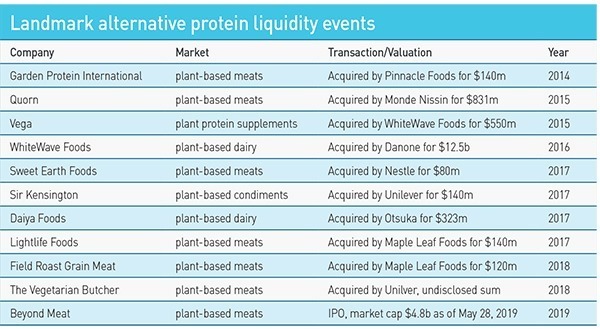
Food tech: Irresistible recipes
Food technology is a virtually endless horizon of profound and unignorable investment imperatives mistaken as a niche category. Alternative protein is the first opportunity set to gain serious traction
The global food system, and by extension the human race, is set to be in crisis by mid-century. Trends around overpopulation and increasing average wealth are expected to provoke severe national food security and healthcare issues, coinciding with agriculture-aggravated deforestation and climate change challenges. A reluctance to sacrifice lifestyle, charged by a growing addiction to meat, has kept social and political solutions in check. Technology, however, is proving a more popular candidate for savior.
Private investment activity offers some of the most compelling evidence for this observation. In the US alone, food tech investment in alternative meats, eggs, and dairy products has topped $17 billion, according to industry researcher the Good Food Institute (GFI). About 80% of this was committed in 2017 and 2018. Globally, the $1.7 trillion meat industry has attracted the most attention through insect and plant-based substitutes, as well as lab-produced animal tissue, known as cultured meat. MarketsandMarkets says meat substitutes will be a $6.4 billion industry by 2023.
A clutch of VC-backed unicorns has emerged amidst the excitement, the most ambitious of which are making their presence felt in Asia. These include Just Eggs, which is currently rolling out in China with the help of local partners such as JD.com and Alibaba Group's Tmall platform; Impossible Foods, a veggie burger specialist angling a more nuanced charm offensive in three of the region's most cosmopolitan hubs; and Beyond Meat, the segment leader which made headlines this month with a $240 million US IPO that valued the company at about $3.9 billion.
Beyond Meat, which is backed by Kleiner Perkins, initially planned to raise $184 million at a valuation of around $1.2 billion, in line with the reported valuations for its recent Series G and H rounds. But market capitalization since the outsized float has hovered around $5 billion, generating a fair amount of concern. Beyond Meat is recognized for an excellent product, but not for particularly deep R&D. Its relatively long ingredients list is seen as vulnerable to challengers with a potentially better story to tell about simplicity, nutrition and naturalness.
Even as the IPO is held up as a validation of the alternative protein industry and a confirmation of investor confidence in the irreversible nature of the trend, nerves around perceptions of a tech-style hype curve are amplified by the notion that Beyond Meat may be more about branding savvy than intellectual property (IP) or unique technical assets. This has led to suggestions that the latest crop of alternative meats is insufficiently differentiated from earlier iterations such as Tofurky or Linda McCartney Foods.
"Like in any sector where there's a lot of justifiable excitement, that leads in some cases to valuations that are not justified. And a lot of time, the investors who are investing at those unreasonable valuations are the ones who just don't know the space very well," says Nick Cooney, a managing partner and founder at Lever VC, whose investment team has backed the likes of Beyond Meat and Just Eggs. "They've heard about a couple of the hallmark companies that are getting a disproportionate amount of media attention and they end up dramatically overpaying."
A crowded market
A co-founder of GFI, Cooney has been active in the alternative protein space for 15 years and an investor for the past four. Lever is targeting a $50 million corpus for its debut fund that will be co-managed with Hong Kong's BlackPine Private Equity. The VC, which has made four investments to date, including two in Asia, is perhaps the latest in an eruption of dedicated alternative protein investors known for framing their operations in terms of high-minded planetary problem solving as much as value-add credentials.
Other new players of this ilk include VegInvest, New Crop Capital, PowerPlant Ventures, Five Seasons Ventures, and Big Idea Ventures, as well as China-based firms Dao Foods International and Bits x Bites. The latter two joined Founders Fund last week in a $16 million round for a cultured meat company called Wild Earth, also backed by VegInvest. The groundswell coincides with a string of PE and VC exits such as Exponent Private Equity and Intermediate Capital Group selling Quorn, a branded retailer in fungi-derived ingredients called mycoproteins, to the Philippines' Monde Nissin for $830 million.
More activity in this vein includes a ramp-up at Singaporean food tech investor VisVires New Protein, which recently launched its second fund with a target of $150 million, almost quadrupling the size of its debut. VisVires subscribes to one of the industry's quickly crystalizing schools of thought: that most of the growth potential is in underlying technology rather than household brands. The firm sees VC as a useful tool for helping early-stage food tech companies achieve scale and connect with supply chain partners – but the asset class will have its limits.
"There are a lot of things in the food and ag space that are not suitable for venture capital because either they don't provide the return we need, or the rollout will be too long," says Matthieu Vermersch, a managing partner and founder at VisVires. "A food business will not have a biotech margin; it will be a single-digit margin business. Even in technology, there may be innovation, but if there are no takers down the road, an exit will be difficult. For us, the worst thing would be to invest in some interesting technology that doesn't create demand by solving a real, urgent problem."
This philosophy goes to the heart of the skepticism around the latest cohort of unicorns. Customer-facing start-ups can more easily leverage the general enthusiasm around food tech themes, and there appears to be an insatiable demand for new brands at the store level. Likewise, the enormity of the traditional meat space suggests multiple winners will be able to carve up meaningful market share. But an avalanche of undifferentiated brands could make for a precarious, top-heavy ecosystem.
"The price that Beyond Meat was debuting at the IPO was pretty reasonable but what we saw after the IPO has been crazy. The stock is more than 50x sales now, way out of line with the value," says one investor. "Impossible Foods is overvalued too, but given what just happened to Beyond, it's quite possible an investor coming in today could still get a healthy return because of the hype around that company."
To its credit, however, Impossible Foods has managed a lack of infrastructure and partnering options in the early days of its industry by building a vertically integrated business model. In addition to branding efforts that have realized a 90% meat-eater customer base across some 10,000 locations, the company has pushed hard in the laboratory, isolating what it claims is the world's only plant-based molecule for replicating the bloody, iron-rich properties of meat. Temasek Holdings and Horizon Ventures were convinced enough to lead a $300 million round this month at a valuation of $2 billion.
"These investors are not known for backing disruptive, frothy early-stage companies. They're known for backing mature, global companies that have an empirical basis for the investment thesis they make. Frankly, they're known for backing companies that act as though they're public," says David Lee, COO of Impossible, emphasizing that his company is in no rush to IPO. "People have long been looking for innovation in the meat-eater market, which really has not had innovation for decades."
Issues of scale
Impossible has also reflected an understanding of the need for differentiation in its scaling strategy. The company has taken an unusual B2B approach, stressing restaurant supply and celebrity chef collaborations. The idea is that meat-eaters are more open to trying new things when selecting from a menu rather than from a grocery store shelf, and in developed markets such as the US, more ground beef is eaten at restaurants and stadiums than at home. The interactivity has an added effect of encouraging social media chatter and creating buzz ahead of a retail launch.
"The key for us is to offer a product and brand that can be made relevant to any culture because it can be transformed by any chef. That's why when you see us enter a market, we do so with a fair amount of chef diversity because we know that that will highlight the fact that each experience will be different for the meat-eater," Lee adds. "Our business in Asia has grown more than 3x since March, so it's an important market for us, even in the limited space of Singapore, Macau and Hong Kong, where we chose to launch."
Scaling is one of the biggest risk considerations at the early development stages, where most investment activity is set to occur. Mass production and distribution channels can be costly in bio-sensitive products and difficult to plan for without an existing partnership with a traditional food industry player. Alternative protein formulations are also known for being particularly difficult to calculate in terms of texture and taste, putting products at the test-marketing stage with limited customer feedback under significant pressure to take shots in the dark.
Effective deal sourcing therefore requires an understanding of agriculture, manufacturing, biotech, and consumer behavior. This is essential in assessing the potential of de-risking options such as lowering assembly line unit costs or developing IP that is valuable enough to attract clients in tangential biochemical markets such as cosmetics or pharmaceuticals. Compromises will ultimately have to be made, however, given the difficulty of identifying teams able to marry a strong sense of branding with technological capacity in the lab.
"The question is whether the people who are the best-placed to develop a product are necessarily the best-placed in the market to distribute it. In some deep tech areas, including alternative proteins, I'm not convinced that's always the case," says Samantha Wong, a partner at Australia's Blackbird Ventures. "That's where VCs need to be careful by not suggesting the only way to go is to build a B2C product when actually there are going to be absolutely enormous opportunities in B2B that are more suited to the scope of the founding team."
Wong counts only four alternative protein start-ups across Australasia despite a historical reputational advantage in sustainable foods. Blackbird made its first investment in the space last year with a pre-seed round in an Australian cultured meat developer called Heuros, which is now in the process of forging its first partnerships to co-develop preliminary products. Most recently, Blackbird joined a $7 million round for SunFed Meats, a New Zealand-based retailer of plant-based meat substitutes.
Consumer or tech?
SunFed aims to separate itself from the burger pack with a chicken-focused product suite that features large, fleshy strips that are more amenable to Asia Pacific cooking cultures. Blackbird was attracted to the company's regional brand positioning and manufacturing efficiency; it's first products were brought to market with only about $1.5 million in capital. However, the clean and simple pea-based ingredients stack is arguably vulnerable to competitor replication.
"The trend of plant-based meat is large and gaining momentum, but the new markets being created will need a lot of new science. Those opportunities in technology will be much more interesting than the end-products themselves," says VisVires's Vermersch. "The wave is just beginning, but it's already being commoditized. Pretty much all the big names like Nestle and Tyson will be launching competitive products in the next 12 months. We need to provide that industry with solutions in nutrition and production processes."

All of VisVires' deals to date have involved technologies. The firm invests globally but only where companies are facing food system problems relevant to Asia. Earlier this month, it led a $12 million round for Aleph Farms, an Israeli cultured meats developer that has identified Asia as its key growth market due to longstanding concerns by regional meat industry regulators around food-borne illnesses and antibiotic-resistant bacteria.
CEO Didier Toubia co-founded Aleph Farms by parlaying a background in food engineering, medical science and hunger reduction legwork for the World Bank in Africa. He has led the application of human tissue regeneration techniques to cow cells and aims to establish commercial-scale operations by 2021. This will encompass systematized meat cultivation via "bio-farm" facilities similar to a dairy plant.
"The way meat is produced today is very far from being natural and traditional," Toubia says, evoking modern breeding techniques, including the use of hormones. "It's not that we're replacing nature with technology – we're replacing a world that can be cruel with a world that is a little bit better. The issue is whether it's progressive and ethical, and I believe that this food will progress humanity and is a lot more ethical than what is being done right now."
Aleph Farms is currently capable of producing thin steaks about the size of a credit card for about $60 apiece in a lab environment. The long-term goal is to get this down to $6 per kilogram in the bio-farms, but the cost challenge is considered a significant hurdle. To date, most players in this space can only achieve mince-style protypes, not slices, and the consensus projection is that commercial viability remains at least five years away.
Cultured meat has nevertheless established itself a sizeable investment vertical. According to GFI, global investment in cell-based meats has reached only $73.3 million to date, but a rapid acceleration is underway, with deal volumes having increased 160% during 2018 to 22 transactions worth a combined $49.4 million. The expectation is that if cultured meat start-ups can manage to get their IP reasonably close to commercial readiness, large strategic players will swoop in to finish the job, generating exits.
Into Asia
At the same time, the protein market will become increasingly complex, placing cell-based meats alongside a wider range of plant-based products and even edible proteins grown from bacteria. Sustainable Bioproducts, a company initially backed by NASA to develop this technology, raised $33 million earlier this year with support from agribusiness giants Archer Daniels Midland and Danone, as well as 1955 Capital, a GP that invests start-ups with upside in Asia.
It is hoped that Asia will see the fastest consumer and government uptake of alternative protein technology due to an existing familiarity with products such as bean curd and historical troubles with food safety, perhaps most notably in China. Indeed, for this reason, China is one of the only jurisdictions globally where start-ups are expected to experience significant regulatory friction when introducing novel products.
Bits x Bites, which bills itself as the country's first dedicated food tech VC, says concerns around regulations in China are one of the top concerns among its international portfolio companies. The firm's advice is to take the slow road by progressing defensible IP through the regulatory trenches instead of succumbing to the fast-and-easy route of unsustainable, fad-driven expansion.
"We're spending a significant amount of time on the upstream and how you can use technology to either improve supply chain efficiency or do something transformative such as cell-based meats, because if you really want to solve a big pain point, you cannot do it by building a company in 12 months," says Matilda Ho, founder of Bits x Bites. "It takes a long time. That's why we'd rather put our patient capital into agtech solutions rather than business model innovation in the downstream."
Latest News
Asian GPs slow implementation of ESG policies - survey
Asia-based private equity firms are assigning more dedicated resources to environment, social, and governance (ESG) programmes, but policy changes have slowed in the past 12 months, in part due to concerns raised internally and by LPs, according to a...
Singapore fintech start-up LXA gets $10m seed round
New Enterprise Associates (NEA) has led a USD 10m seed round for Singapore’s LXA, a financial technology start-up launched by a former Asia senior executive at The Blackstone Group.
India's InCred announces $60m round, claims unicorn status
Indian non-bank lender InCred Financial Services said it has received INR 5bn (USD 60m) at a valuation of at least USD 1bn from unnamed investors including “a global private equity fund.”
Insight leads $50m round for Australia's Roller
Insight Partners has led a USD 50m round for Australia’s Roller, a venue management software provider specializing in family fun parks.







